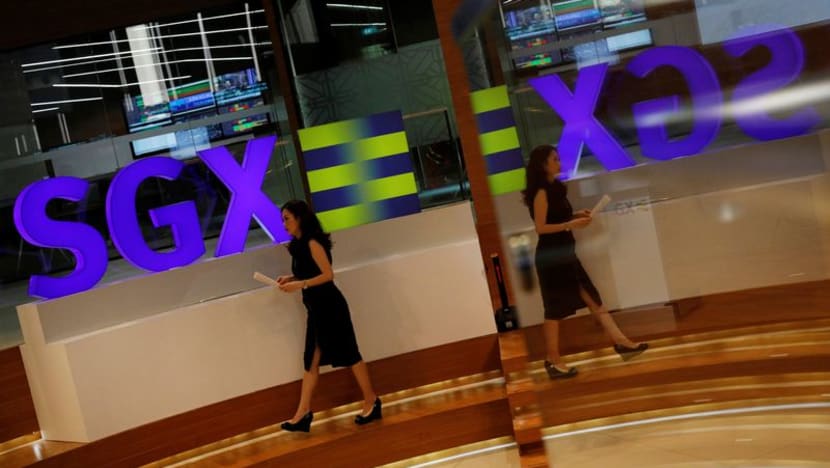Market watchers less bullish on Singapore stocks this year
Economists said this year is likely to be less smooth sailing than 2024, with demand from major trading partners directly impacting Singapore's export-reliant economy.

An SGX sign is pictured at Singapore Stock Exchange July 19, 2017. (File photo: REUTERS/Edgar Su)

This audio is generated by an AI tool.
SINGAPORE: Market watchers are less bullish on Singapore stocks this year, citing uncertainty in how global interest rates could trend and possible trade restrictions that could be imposed when the United States changes presidents later this month.
A stellar performance by the three local banks helped push the benchmark Straits Times Index (STI) up 16.9 per cent in 2024 – marking its first double-digit expansion in three years and its best showing since 2017.
Analysts said the finance sector's rally will likely continue this year.
“We are seeing the net interest income portion really holding up despite the (US) Federal Reserve’s rate cutting cycle. The recovery momentum in terms of wealth management activities have also offered an added boost for the banks’ earnings,” said Mr Yeap Jun Rong, a market strategist at trading platform IG Asia.
“Heading into 2025, there is a lot of optimism that as the Fed's rate cutting process is set to slow, that could continue to support some of the interest income for the banks, which take up the bulk of their earnings.”
HEADWINDS AHEAD
Economists said this year is likely to be less smooth sailing than 2024, with demand from major trading partners China, the US, and the European Union directly impacting Singapore's export-reliant economy.
If US interest rates remain high, this may impact its economic growth and have knock-on effects in Singapore's equities market.
One such casualty could be real estate investment trusts (REITs), which are expected to stay under pressure for the first half of the year but may rebound later.
“What we'll be looking for this year is obviously the ability for the REITs to increase their net property income and occupancy rates, generate positive rental reversion, book new tenants,” said Geoff Howie, a market strategist at the Singapore Exchange.
Whether the US’ growth momentum can be sustained is among the key risks to watch, as there could be greater trade-offs for growth conditions if rates were to be kept at restrictive territory longer, said Mr Yeap.
For China, its economic picture is uneven as consumer and business confidence remain low, and could need some sort of stimulus to spur more sustained recovery, he added.
“For now, it seems a lot of challenges are still faced by the world's second largest economy. We really got to see a stronger recovery in China to offer somewhat of a tailwind for Singapore's export demand,” he said.
Another key risk is the power transition in the White House, and whether President-elect Donald Trump follows through with his promises to impose tariffs on trading partners, adding to the geopolitical tensions between the US and China.
“Any tit-for-tat trade retaliation between the US and China will have a negative impact on Singapore’s export growth,” Mr Yeap said.
Additionally, Singapore will hold general elections by November, and investor confidence will also be impacted by voters’ mandate.
“CAUTIOUS OPTIMISM”
Singapore's economy grew at a higher-than-expected 4 per cent last year, according to advance estimates released by the Ministry of Trade and Industry (MTI) on Thursday (Jan 2).
Economists expect slower growth this year, hovering around 2 to 3 per cent.
Mr Howie said investors should approach the year with “cautious optimism”.
“We’ve still got stable growth for the year – there were some pretty significant turnarounds in personal computers, integrated circuits and petrochemicals,” he noted.
Mr Yeap said valuation wise, Singapore equities remain inexpensive compared to global peers.
The economic condition across the region remains stable and resilient, and the Johor-Singapore Special Economic Zone is set to enhance connectivity and provide more opportunities for businesses, experts said.
International visitor arrivals have also recovered to pre-pandemic levels and are expected to continue this year, adding a boost to the economy.
“The silver lining for 2025 is that Singapore's macroeconomic conditions will likely remain stable,” Mr Yeap said.
“We’re (seeing) a global semiconductor demand that may be set to persist in 2025. So that should offer somewhat of a tailwind for our electronics sector, which we have seen over the past few months.”
All eyes are also on the review group formed by the Monetary Authority of Singapore to strengthen the local stock market.
Some measures previously mooted include getting more companies to go public, and enhancing the regulatory regime to improve market growth. A report on the recommendations is set to be completed later this year.
Singapore stocks closed the first trading day of the year flattish, inching up 0.16 per cent at 3,793.57.















